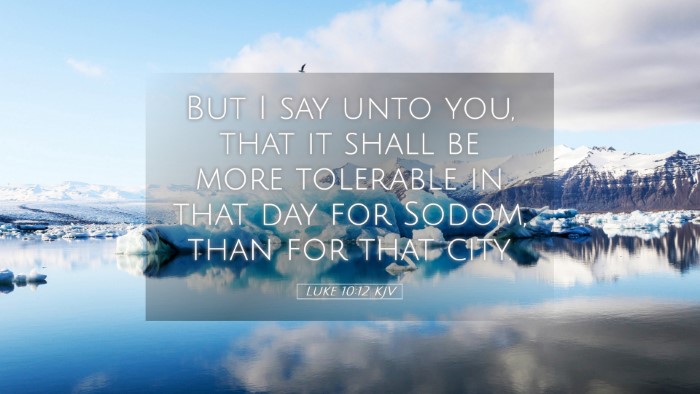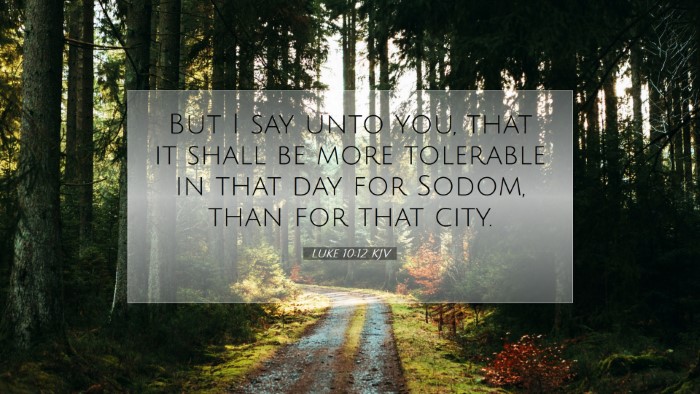Commentary on Luke 10:12
Luke 10:12 states, "But I say to you that it will be more tolerable in that day for Sodom than for that city." This verse emerges from a moment when Jesus sends out the seventy-two disciples to proclaim the Kingdom of God. The context indicates a warning of judgment against cities that reject the Gospel.
Contextual Analysis
This statement is a sober reflection of the consequences of rejecting God’s message. Albert Barnes highlights the severity of judgment due to the knowledge of the truth and the responsibility that comes with it. Cities that fail to receive the disciples and their message endure a perilous fate.
Historical Significance of Sodom
Reference to Sodom is significant, as it symbolizes the epitome of immorality and divine judgment. Adam Clarke notes that Sodom's destruction serves as a prototype of God’s fierce judgment against sin. The association of a rejecting city with Sodom suggests that such cities are not merely negligent but are committing grievous offenses against divine revelation.
Theological Implications
This verse reveals profound theological insights regarding divine judgment and mercy. Matthew Henry stresses that judgment is not arbitrary; it is based on the degree of light and knowledge given. Those who witness miracles and hear the Gospel yet reject it face more severe consequences than those who had less information regarding God’s will.
Degrees of Judgment
Barnes elaborates on the concept of “more tolerable.” He suggests that this implies degrees of punishment in the afterlife, acknowledging that God’s justice is measured according to the revelation each person or community has received. The greater the light, the greater the accountability.
Practical Applications
For pastors and church leaders, this verse serves as a poignant reminder of the weight of Gospel proclamation. Those in leadership must understand that their responsibility is not merely to teach but to convey the truth with the awareness that rejection leads individuals toward serious repercussions.
- Importance of Evangelism: The urgency for evangelistic outreach is paramount; refusal to hear the message has dire consequences.
- Moral Responsibility: Christians need to reflect on their part in revealing Christ to others and the impact their witness may have.
- Judgment and Mercy: This passage compels believers to consider the balance of God’s justice and mercy, reminding them of the latter's availability for repentance.
Conclusion
Luke 10:12 serves as a stark reminder of the reality of divine judgment and the dire consequences of rejecting the Gospel. The insights from public domain commentaries offer rich theological depths that are essential for pastors, students, and scholars, enhancing their understanding of the gravity of following Christ's command to share the message of the Kingdom.
In light of this warning, may the churches grow in their fervor to reach out with the Gospel, understanding the eternal weight of the messages they bear.


